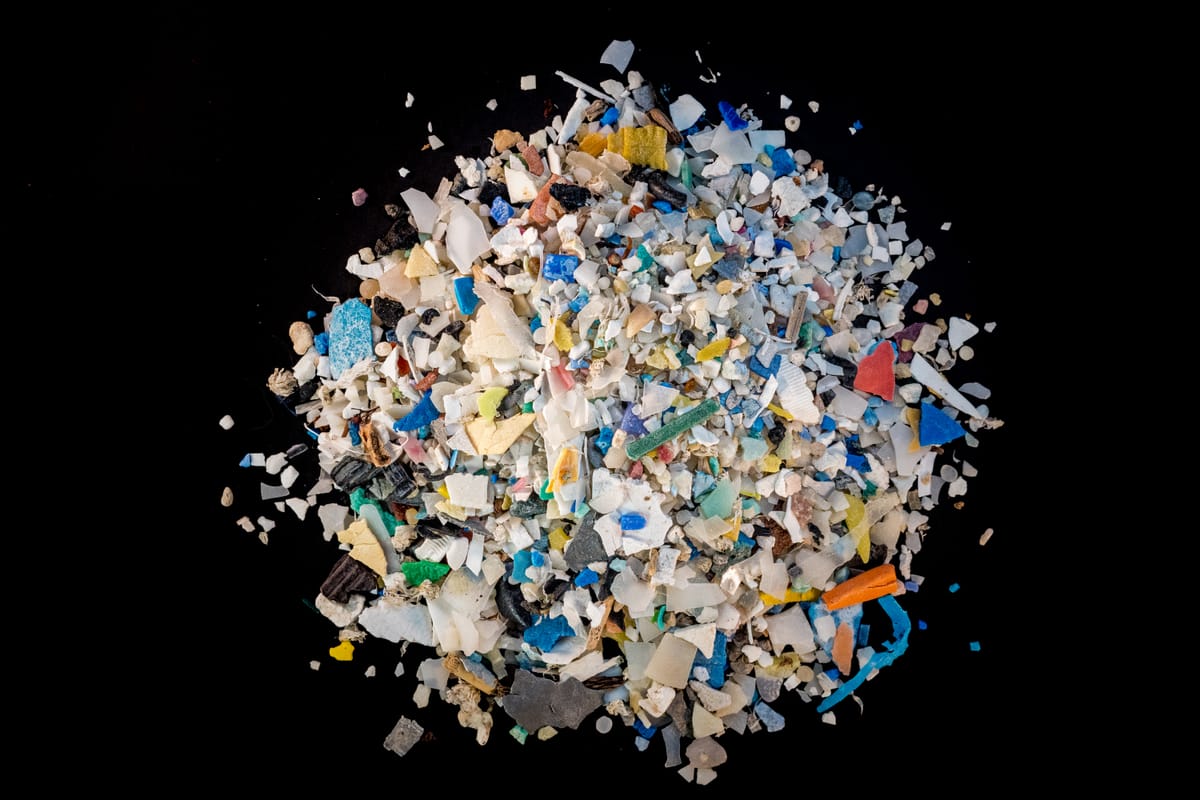This week, we're exploring a new study on microplastics in our brains, successful efforts to save the dire wolf from extinction, Jeff Bezos's investments in an EV truck company, and research to reduce methane emissions from cows.
If you enjoy our Weekly Brief, please consider sharing it with your friends and colleagues in the climate community and encourage them to subscribe here. You can also follow Tectonic on LinkedIn and Instagram for more regular updates.
Impact of microplastics in our bodies: Researchers at the University of New Mexico are studying how microplastics accumulate in the human body, finding that brain samples from 2024 had nearly 50% more microplastics than brain samples from 2016, with brains of people with dementia having far more microplastics. The team found the average brain had about seven grams of plastic – as much as about five water bottle caps. They also found microplastics in human testes, placentas, and other organs, but are still unsure what amount it takes to cause health problems.
Bringing wolves back from extinction: Colossal Biosciences, valued at more than $10 billion, has successfully brought back the extinct dire wolf through genetic engineering and ancient DNA, with two males and a female born through surrogate mothers. The company aims to de-extinct other species, including the woolly mammoth, dodo, and thylacine, and believes this technology can also help prevent endangered species from going extinct. The company argues that genetic engineering is a vital tool to reverse the loss of genetic diversity, with 30% of the planet's genetic diversity predicted to be lost by 2050. The dire wolves, Romulus, Remus, and Khaleesi, are being raised in a 2,000-acre ecological preserve with a staff and veterinarians to care for them. The company is also working on bringing back the woolly mammoth by editing the genes of Asian elephants to match those of the mammoth, with a goal of having a calf born by 2028.
a16z backs home battery business: Base Power, a startup co-founded by Zach Dell, has raised $200 million in a Series B round led by Addition, a16z, and other investors to expand its home backup battery business. The company offers large batteries at a lower upfront cost, but customers must commit to buying electricity from Base Power for three years at a fixed rate. The funding will speed up installations, expand into new states, and build a domestic battery factory, with plans to reach the 100 megawatt-hour mark by summer.
Bezos backs EV company: Jeff Bezos is backing an EV startup called Slate Auto, which aims to produce an affordable two-seat electric pickup truck for around $25,000. Slate Auto raised $111 million in a Series A round in 2023 and has hired hundreds of employees, many from Ford, General Motors, and Harley-Davidson. The company plans to start production as soon as late 2026 and will supplement its low margins by building a line of accessories and apparel that owners can use to customize their vehicles.
Bezos backs research to reduce emissions from cows: The Bezos Earth Fund is investing $19 million to research and breed climate-friendly cattle that produce less methane. The initiative aims to identify genetic traits in low-methane emission cattle and sheep by scanning over 100,000 animals across the globe. The goal is to provide farmers with data to select and breed cattle with lower methane emissions, reducing the environmental impact of livestock farming without requiring changes to their farming practices.
Debt swaps gain interest: Citigroup plans to build a pipeline of debt swaps targeting developing markets, allowing sovereign issuers to refinance debt and allocate savings to various goals. The debt swaps, known as debt-for-development swaps, expand on traditional debt-for-nature swaps and can be used for goals such as food security, energy transition, and health and education. According to Stephanie von Friedeburg, a managing director at Citigroup, 5-6 deals may materialize over the next 1-2 years, with the market having the potential to unlock up to $100 billion in climate and nature finance.
NYC congestion pricing continues: The MTA and the Trump Administration have reached an agreement that could keep NYC congestion pricing in place into the fall, with a deadline of at least October. The program has shown signs of success, with $51.9 million collected in February and reduced congestion reported by drivers and officials. The MTA is on track to meet its year-end goal of $500 million, with $78 million to be transferred to a "lock box" for use in capital projects.
US exits talks on carbon charge for shipping: The US has exited global discussions on implementing a carbon charge for the shipping industry, threatening to take reciprocal measures against any fees imposed on its merchant fleet. The move may impact attempts to decarbonize shipping, with the International Maritime Organization (IMO) aiming to agree on a carbon charge for the maritime sector, and the US urging other governments to reconsider their support for the measures.
Trump signs order boosting coal: President Trump signed executive orders to revive the US coal industry by loosening environmental rules and opening new federal lands for coal mining. The orders also aim to prevent unprofitable coal plants from shutting down and to identify state and local policies that harm the coal industry, with Trump instructing the Justice Department to fight these policies. Despite these efforts, analysts believe a major coal revival is unlikely due to the old and expensive coal plants, with many already scheduled for retirement.
Ann Arbor seeks net zero: Ann Arbor, Michigan, aims to achieve net-zero emissions by 2030 and plans to create a sustainable energy utility (S.E.U.) to help residents use less energy. The city's S.E.U. will go beyond traditional models by building its own solar and geothermal power facilities, with the goal of creating microgrids that can operate independently. The project, which is expected to start operating by 2026, will allow residents, businesses, and organizations to opt-in to use power from the S.E.U., with the city owning the infrastructure.
Republican Senators defend Biden climate law: Four Republican senators, including Lisa Murkowski, John Curtis, Thom Tillis, and Jerry Moran, are warning against a full repeal of energy tax credits in the climate law. They are urging Senate Majority Leader John Thune to take a targeted approach that balances priorities without disrupting private-sector investments and American energy innovation. The senators argue that a wholesale repeal could lead to significant disruptions and weaken the US position as a global energy leader, and are pushing for a more measured approach to avoid uncertainty and jeopardizing job creation.
IEA warns about AI power demands: The International Energy Agency (IEA) reports that growth in AI-focused data centers will increase demand for gas- and coal-fired power plants. Power demand from data centers is projected to double by 2030, with gas supplies likely to power most of the capacity expansion in the US, the biggest market. The IEA notes that the increased use of fossil fuels will have huge implications for greenhouse gas emissions, particularly in the US and coal in China, the No. 2 market.
Explore ways we can work together.


